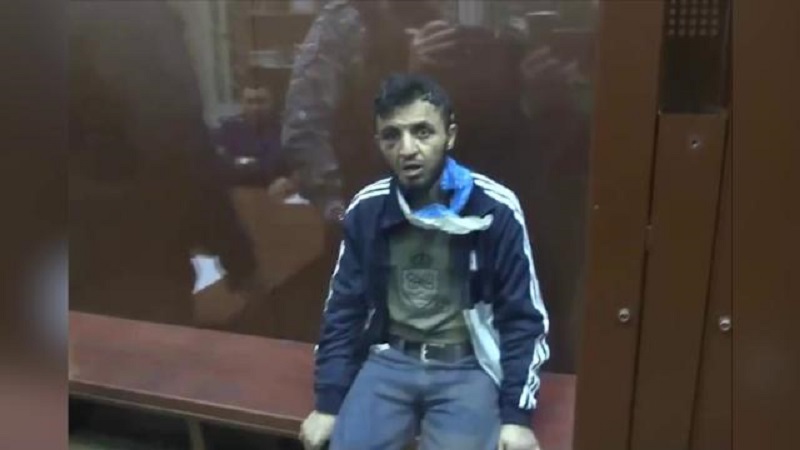Tajikistan's terrorists and Russian reactions
The news following the court session that validated the arrests triggered a wave of intolerance towards Tajiks and immigrants, with calls on social media to kick all Asian taxi drivers out of the country. President Rakhmon called Putin on the phone, expressing his strong condemnation of the terrorist act and confirming that 'they belong neither to our nation nor our religion'.
Moscow (AsiaNews) - The Basmanny court in Moscow has ordered the arrest of 11 suspects for the Krokus City Hall massacre on March 22, including 4 people accused of being the material perpetrators of the massacre; according to now official data, all four are citizens and natives of Tajikistan, Dalerdžon Mirzoev, Saidakrami Račabalizoda, Mukhammadsobir Fajzov and Fariduni Šamsiddin.
They all arrived in court with clear signs of torture and would have confessed to the crime committed, and now risk life imprisonment. The court session was held behind closed doors - although images of those arrested were released - to "not divulge state or other secrets", and also for "the safety of the participants in the trial and the relatives of the victims". .
Nothing is known about the fate of the other seven arrested, but the four terrorists now have an extremely detailed identity. Mirzoev is 32 years old, has 4 children including 1 and a half year old twins, and was registered for temporary work in Novosibirsk in Siberia with a three-month visa that had already expired.
The turbo-Putin host Margarita Simonyan released the video of his interrogation, calling him "the head of the demons". He lived in a hostel for immigrants together with Fajzov, and about ten days ago he had met a certain Abdullo who had given him a car to be a taxi driver.
Fajzov himself, 19 years old, single and childless, was brought to the courtroom on a stretcher, attached to a catheter, having been injured during arrest; he worked as a barber's assistant in Ivanovo, 300 km from Moscow.
Račabalizoda answered the judge's questions through an interpreter, knowing almost nothing of the Russian language. He stated that he was 30 years old, had a wife and a child, and had recently registered in Russia in a location whose name he did not remember, and had not yet found a job. The police cut off one of his ears, forcing him to eat it, and he confessed that he had only done "what my friends asked me to do."
Shamsiddin is married and has an 8-month-old son, he registered in Krasnogorsk and works in Podolsk in the province of Moscow; he arrived in Russia 4 months ago from Turkey, and it was he who explained to the investigators that "we killed people only for money", for a fee of 500 thousand rubles (about 5 thousand euros), half of which was paid in advance on the bank card.
The person who hired the four murderers was the collaborator of an Islamic preacher, on whose Telegram page they were registered, and all communications took place via the same messenger.
On Telegram channels, the day after the massacre, the news spread that the attackers could have been Tajik citizens. Dushanbe's foreign ministry immediately denied that its citizens could have participated in the terrorist action, considering it fake news, and inviting the media to use only the official sources of Russia's state bodies.
Tajikistan's Interior Ministry later stated that two of the suspects, Rivodzhiddin Ismonov and Makhmadrasul Nasriddinov, had no connection with the attack and were currently at home in their homeland, where they had returned from Russia last November.
A third Tajik figure linked to the investigation, Rustam Nazarov, also currently works as a taxi driver in Samara in southern Russia, where he was with his family at the time of the Krokus massacre.
However, the news following the court session sparked a wave of intolerance towards Tajiks and immigrants throughout the Russian population, with calls via social media to expel all Asian taxi drivers from the country, even though Putin explained in his speech to the nation that "the terrorists have no nationality, and they have no future."
The president of Tajikistan, Emomali Rakhmon, called Putin on the phone on March 24, expressing his firm condemnation of the terrorist act and confirming that "they belong neither to our nation nor to our religion." Rakhmon has always been committed to fighting Islamic fundamentalism in his country, also using very decisive and widespread repressive measures at all political and social levels.
The video blogger and model Dina Saeva, Russian of Tajik origin, invited everyone not to incite inter-ethnic conflict: "the tens of millions of Tajiks are not guilty of this act of violence, which cannot be justified in any way". Many other public figures in Russia linked to the Tajik and Central Asian peoples are intervening with similar appeals, but the situation could create tensions that are difficult to control.
10/05/2024 10:02
07/07/2021 10:32
12/06/2021 14:56
18/11/2016 15:51
11/11/2019 13:19







.png)










